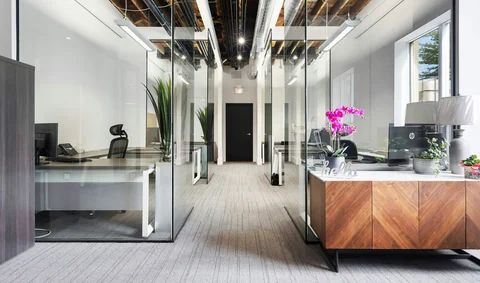
Nowadays most people don’t think startups and commercial real estate are related, especially since a lot of startups work remotely now and don’t actually need to own or rent any offices. If anything, the main thing most people hear about startups and real estate is how startups don’t have to spend as much money on leases as they used to.
However, they are still interlinked in one area, and that area is banking. So if you’re a startup founder or work in the startup world, we suggest reading on to learn about how commercial real estate issues can affect startups.
What Are The Problems With Commercial Real Estate?
In the US, commercial real estate is a $20 trillion market. That is an immense number but there are problems with it. One of the biggest trends affecting commercial real estate is the massive increase of post-COVID remote working. A huge amount of people don’t want to have to go into the office, and are now working partly or entirely from home. For example, here at Kruze, we no longer have an office and work totally remotely instead.
Largely due to offices no longer being a necessity, we are now seeing commercial buildings, in places like San Francisco, LA, or New York, being sold for half of what they were valued at 10 years ago on nearly a weekly basis. Blackstone’s Real Estate Fund is under heavy fire. There are some major losses beginning to occur, which is something people have been anticipating for a while now.
Price Discovery Has An Effect Regional Banks
Now that properties are starting to sell and starting to change hands, we’re seeing some important price discovery. We are discovering that prices are 40%, even 50%, too high and this is going to affect a lot of regional banks, more so than the mega banks. Of course these larger banks participate in real estate lending too, but regional banks are the ones with the majority of commercial real estate loans on their balance sheets.
So the crisis, which has been brewing for a while now, comes down to the fact that there is really no way for the regional banks to sell those loans, unless it’s at a distressing price/big loss to them. Therefore, they are forced to sit on them and hold them, which causes a different problem.
Ultimately, now that there is actual price discovery happening and things are being traded, auditors and the banks themselves are going to have to start marking down the debt that they own. This could trigger insolvency and then possibly a bank run.
What Does Insolvency Mean For Startup Banks?
First of all, let’s clarify what insolvency means. Essentially, when a company is insolvent it is still running while simultaneously being effectively bankrupt. There is no equity left in the company if you were to liquidate, for example. Naturally, this upsets a whole bunch of people, including:
- Investors
- The stock market
- Regulators
- Other stakeholders
This freaks everybody out, which can trigger a bank run, which is the mass withdrawal of funds from a bank due to fears of insolvency. This is what happened with Silicon Valley Bank (which crashed last year) and First Republic, except for the fact their insolvency was caused by mortgage loans they were sitting on. Commercial real estate is obviously different and, actually, a much bigger problem. The potential for all regional banks to be affected means the problem could span the entire economy.
Startup Banks Are Regional Banks
Regional banks are major bankers to startups. Regional banks provide many fundamental things a startup needs, like:
- Payroll accounts
- Business accounts
- Loans
- Cash management
So lot of startups, including a lot of our clients, use regional banks and that means this issue in commercial real estate is something for startups to be concerned about.
How To Protect Your Startup
To protect your startup and its money from this potential oncoming crisis, one of the first things we suggest you have is an escape hatch bank. We have a really good video on this which you should definitely check out here but, ultimately, along with your regional bank, we recommend having other accounts open with a mega bank so you can transfer money in and out of as necessary. For more information, look at our list of best banks for startups.
Ultimately, if you are in the startup world, you need to be paying attention to the commercial real estate situation as it could hit some of the regional banks where you keep your startup’s cash. Just be careful and let’s hope that interest rates come down, people start returning to the office, and the commercial real estate goes back up in value.
If you have any other questions on startup banking, valuations, startup investing, startup accounting or taxes, please contact us. You can also follow our YouTube channel and our blog for information about accounting, finance, HR, and taxes for startups








